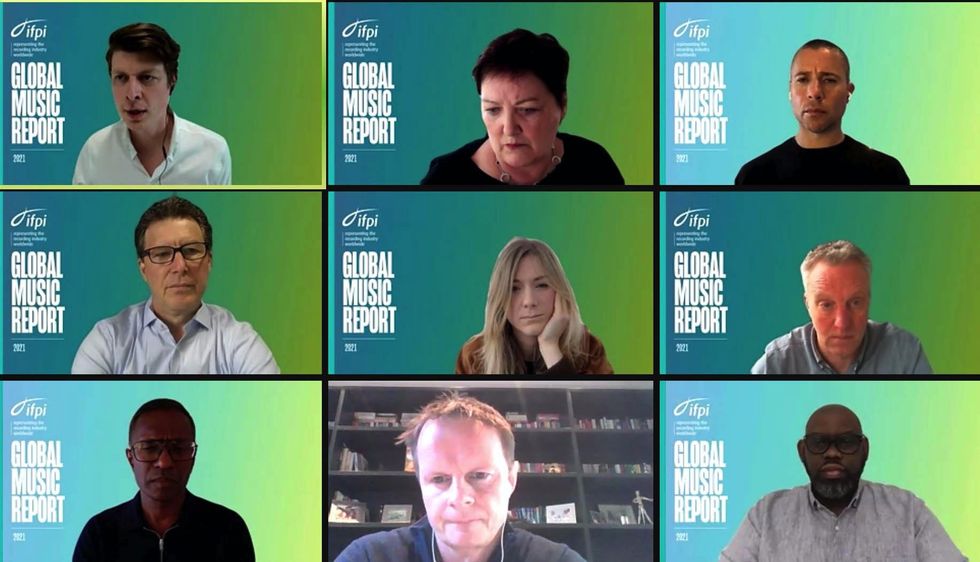IFPI Global Sales Report Rich In Detail, With A Price Tag To Match
With the world in lockdown for most of 2020, exercising to music, gaming, and listening to more music in general at home, it’s not surprising that the global recorded music market grew by 7.4%, the

By Karen Bliss
With the world in lockdown for most of 2020, exercising to music, gaming, and listening to more music in general at home, it’s not surprising that the global recorded music market grew by 7.4%, the sixth consecutive year of growth, according to The International Federation of the Phonographic Industry (IFPI), which represents the interests of about 8000 members of the recording industry worldwide. Total revenues for 2020 were $27.12 billion (USD $21.6B), driven by streaming, which increased by 18.5%, according to the 2021 Global Music Report released March 22.
A 40-page version is available as a free download, and a 170-page premium version for $25,800 (£15,000) with an option for a “complimentary” hard copy. The same premium version is available to the recorded music industry (entities whose primary activity is the creation / production / publishing of music recordings) and academic/non-profits for $5,167 (£3,000), subject to verification. Sample pages are available for download.
In the free report, Canada sits at No. 8 on Top Music Markets, between China and Australia. The U.S. is at No. 1. By region, Canada, combined with the U.S., grew 7.4% in 2020, a slower rate of growth than the previous year (11.6%). Canadian recorded music revenues grew by 8.1% in 2020. Streaming revenues rose by 17.8% with subscription income up by 18.2%. That is the only data available about Canada, besides the appearances of Canadian artists The Weeknd, Drake, and Justin Bieber in various charts.
The data, covering 57 markets, is also available for purchase by country, region and format (contact ritco@ifpi.org for a quote).
In a Zoom panel discussion on the report with global industry leaders, IFPI CEO Frances Moore said, “The work and investment from record companies in previous years have really helped over the last year because it's helped lay the foundations for what is a predominantly digital industry that proved its resilience against the extraordinary circumstances we've faced in 2020.
“I think you will sense the optimism throughout the report. Basically, despite the challenges that record companies have faced, they've continued to drive new, exciting experiences for fans, whether it's gaming, exercising or beyond. They've also worked to expand their reach in the world. So they've been driving developments in local markets and connecting them to the global network of music fans. As you’ll see, these themes will play out across the Global Music Report.”
The premium version contains a comprehensive picture of the key trends affecting today's music business; a 30-slide PowerPoint presentation and a detailed Excel spreadsheet that includes all data in a flat file format. The data for 57 markets from 2016-2020, includes breakouts for the Africa/Middle East region, and Vietnam, MENA, Bolivia, and Romania for the first time.
“The pricing of the Global Music Report has been updated to reflect the continued investment in data quality, market coverage and analysis to provide the most accurate and granular snapshot of the global recorded music business,” it says on the order page.
Reflecting on the increased sales and listening habits, Dennis Kooker, president, global digital business & U.S. sales, Sony Music Entertainment, said, “It’s very important to recognize that many of the trends that you're highlighting were trends that were occurring pre-pandemic.
“I think the pandemic and the situation that consumers found themselves in just accelerated some of those trends and part of the reason that these trends are going to very much be an important part of our future is that, ultimately, there was a real focus around the user experience. And so this is naturally a place where consumers, and fans of music, are listening and enjoying music. Whether it be part of your exercise routine or part of a gaming experience, music has always been an integral part of these experiences.
“But we've seen a significant leap forward in the improvement of the user experience and the way that it's integrated naturally with how the consumer is not only listening to the music but enjoying the activity. In particular,” he continues, “focusing just on the immersive entertainment space, what's exciting there is we're seeing a convergence of audio, video and gaming, all coming together. Again, with the user experience that is purpose-built for that experience…we just see that this space is expanding. And in particular, if we think about how important this kind of engaging activity is to fan and artist, and the creativity that it unlocks for the artist if we get this right, ultimately immersive entertainment is going to be an experience that is going to continue to grow well into the future.”
The panel discussion and overview also included Shridhar Subramaniam, president, strategy and market development, Asia and Middle East, Sony Music Entertainment; Konrad von Löhneysen, managing director, Embassy of Music; Sipho Dlamini, CEO, Universal Music South Africa and Sub-Saharan Africa; Adam Granite, executive vice-president of market development, Universal Music Group; Jess Keeley-Carter, senior vice-president, global marketing, Warner Music; and Simon Robson, president, international, recorded music, Warner Music Group.

















